The Role of Funeral Directors: Everything You Need to Know
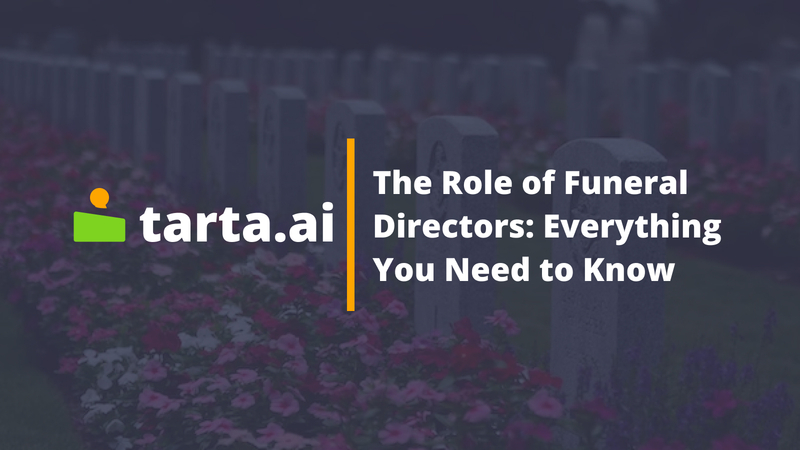
Death is an inevitable part of life, and as such, the funeral industry plays a crucial role in providing end-of-life services and support to grieving families. Funeral Directors are professionals who help families plan and organize funerals or memorial services for their loved ones who have passed away. This article provides a comprehensive overview of the Funeral Director profession, including qualifications, job expectations, work environment, and career paths. It also highlights the importance of supplementary perks in attracting and retaining employees and providing a positive work culture. The article discusses the different roles within the death care industry and the challenges and opportunities facing the Funeral Director profession.
Position Overview
A Funeral Director is a professional who works in the funeral industry and assists families in planning and organizing funerals or memorial services for their loved ones who have passed away. Funeral Directors help families make arrangements for the burial or cremation of the deceased, coordinate the transportation of the body, and handle the necessary legal documentation. They also provide emotional support and guidance to families during their time of grief. Funeral Directors may work independently or as part of a funeral home or mortuary.
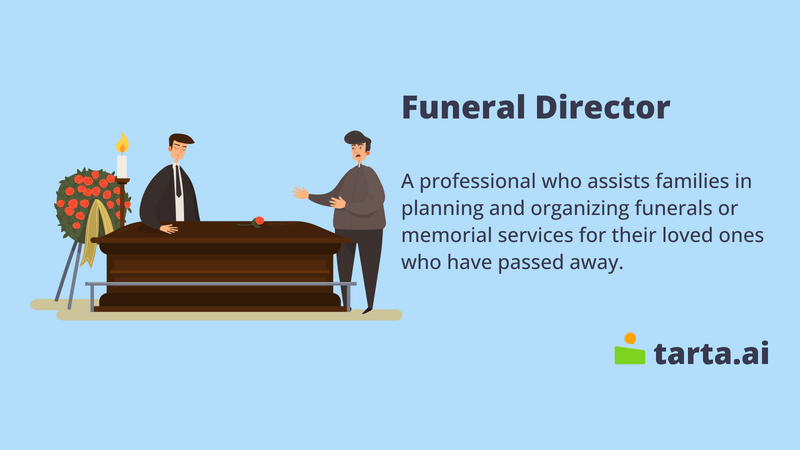
Key Qualifications
Key qualifications for a Funeral Director typically include:
- Education and training: Funeral Directors must complete a degree or certificate program in mortuary science, which includes coursework in funeral service management, embalming, and funeral ethics.
- Licensing and certification: Funeral Directors must obtain a license from their state's licensing board, which typically involves passing an exam and completing an apprenticeship or internship. They may also choose to obtain additional certifications, such as the Certified Funeral Service Practitioner (CFSP) designation.
- Interpersonal skills: Funeral Directors must have strong interpersonal skills and be able to communicate effectively with grieving families. They must be compassionate and empathetic while also being able to maintain a professional demeanor.
- Organizational skills: Funeral Directors must be highly organized and able to manage multiple tasks and responsibilities simultaneously. They must also be able to handle financial transactions and other administrative tasks.
- Attention to detail: Funeral Directors must be detail-oriented and able to ensure that all aspects of the funeral service, including the preparation of the body, the coordination of the service, and the completion of legal documentation, are handled with the utmost care and attention to detail.
Interesting fact:
Funeral directing is a heavily regulated industry in the United States, with each state having its own licensing and certification requirements.
Tasks and Expectations
Tasks and expectations of a Funeral Director can include:
- Meeting with families: Meeting with the family of the deceased to discuss their wishes for the funeral service, including the type of service, the choice of burial or cremation, and other details.
- Preparing the body: Funeral Directors may be responsible for embalming and preparing the body for viewing or burial.
- Coordinating the service: Coordinating all aspects of the funeral service, including arranging for the use of a funeral home or chapel, coordinating transportation of the body, and ensuring that all necessary documentation is completed.
- Providing emotional support: Providing emotional support and guidance to the family of the deceased, helping them to cope with their grief and navigate the difficult decisions surrounding the funeral service.
- Managing finances: Managing the financial aspects of the funeral service, including billing the family for services rendered and processing payments for vendors and suppliers.
- Ensuring legal compliance: Ensuring that all aspects of the funeral service are in compliance with local, state, and federal laws and regulations.
- Maintaining facilities: Maintaining the funeral home or mortuary, ensuring that it is clean and well-maintained and that all equipment is in good working order.
Hard and Soft Skills
Hard skills for a Funeral Director | Soft skills for a Funeral Director |
Knowledge of mortuary science and funeral service management | Interpersonal and communication skills to interact effectively with families, clergy, and suppliers |
Embalming and body preparation | Compassion and empathy for grieving families |
Legal documentation and compliance | Professionalism and ethics |
Financial management and accounting | Attention to detail and meticulousness |
Organizational and time management | Flexibility and adaptability to changing circumstances |
Problem-solving and critical thinking to handle unexpected situations and make difficult decisions | |
Cultural competence to work effectively with families from diverse backgrounds and beliefs. |
Compensation
The salary of a Funeral Director in the United States can vary depending on several factors such as location, years of experience, and education. According to PayScale, the median annual wage for Funeral Directors is $50,000.
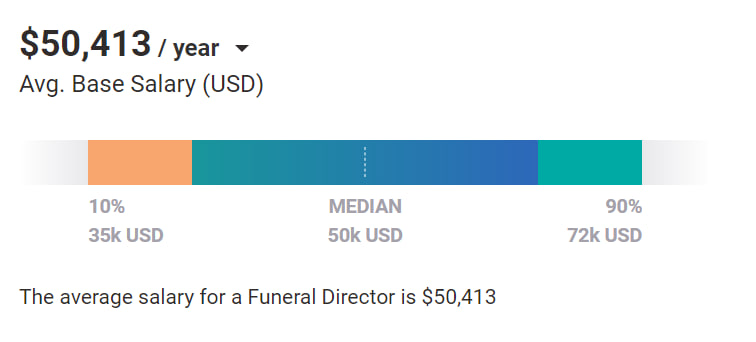
Source: PayScale
However, the salary range for Funeral Directors can be between $35,000 and $72,000 per year. Factors that can influence salary include the size of the funeral home, the number of funerals conducted, and the geographic location.
It is important to note that salaries may also vary depending on the specific job duties of the Funeral Director. For example, some Funeral Directors may also be responsible for embalming, while others may focus on more administrative tasks.
Strategies for Increasing Income
There are various strategies that one can implement to increase their income. Here are some ideas:
- Negotiate a salary increase: If you are an employee, you can negotiate a salary increase with your employer by highlighting your accomplishments, taking on additional responsibilities, and demonstrating your value to the company.
- Pursue further education and training: Investing in further education and training can increase your skills and knowledge, making you more valuable in the job market and potentially leading to higher-paying job opportunities.
- Ask for overtime or additional hours: If you are an hourly employee, you can ask for overtime or additional hours to increase your income.
- Seek out higher-paying job opportunities: If you're not satisfied with your current salary, you can actively seek out higher-paying job opportunities in your industry or field.
Remember, it's important to be realistic and set achievable goals when implementing these strategies. It may take time and effort, but with persistence and dedication, you can increase your income over time.
Interesting fact:
The National Funeral Directors Association (NFDA) is the world's largest funeral service organization, representing more than 20,000 funeral homes in the United States.
Supplementary Perks
Supplementary perks, also known as fringe benefits, are additional benefits that employees receive in addition to their regular salary or wages. These perks can help attract and retain employees, improve job satisfaction, and contribute to a positive work culture. Here are some examples of supplementary perks:
- Health and wellness benefits: This can include health insurance, dental and vision insurance, gym memberships, wellness programs, and mental health support.
- Retirement benefits: Employer-sponsored retirement plans, such as 401(k) plans, can help employees save for their future and provide financial security in their retirement years.
- Flexible work arrangements: This can include options such as remote work, flexible hours, and job sharing, which can help employees balance their work and personal responsibilities.
- Professional development opportunities: Employers can offer opportunities for employees to attend conferences, training sessions, and courses to help them improve their skills and advance their careers.
- Paid time off: Employers can offer paid time off for vacation, sick leave, and holidays, which can help employees balance their work and personal lives.
- Employee discounts: Employers can offer discounts on products and services, such as company merchandise or local businesses, as a way to show appreciation for their employees.
It's important for funeral homes to consider offering a comprehensive benefits package to attract and retain talented funeral directors. By providing these additional benefits, funeral directors can feel valued and supported in their role, which can lead to increased job satisfaction and a positive work culture.
Work Environment
To ensure that you can perform your job duties efficiently, it's essential to have a suitable work environment and access to the right tools and technologies. In this section, we will discuss the different settings that make up a typical funeral home or mortuary and the tools and technologies commonly used by Funeral Directors. Understanding these essential components of funeral directing will help you provide the best possible service to your clients during their time of need.
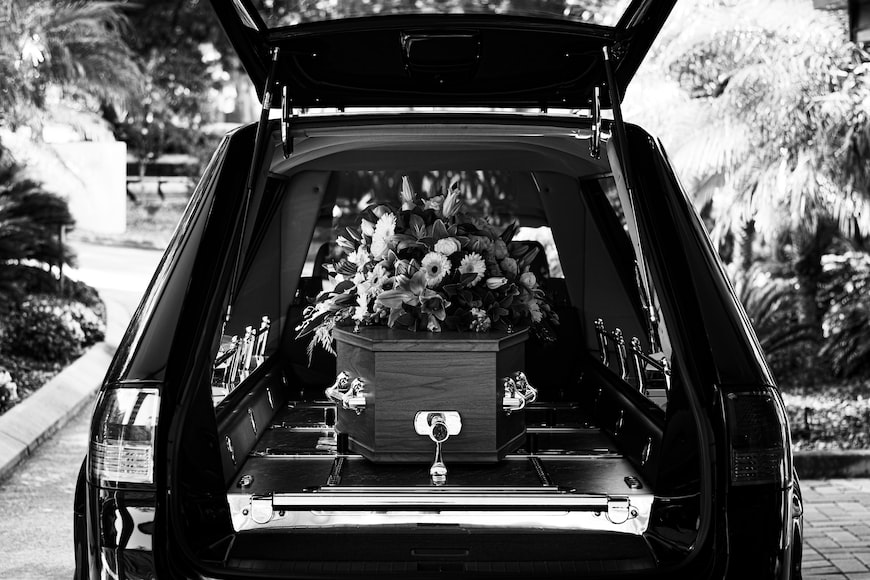
Photo: panyawat auitpol/Unsplash
Work Environment Settings
As a Funeral Director, your work environment is typically a funeral home or mortuary. The following are some important settings that you should consider to create a comfortable and professional work environment:
Setting | Description |
Reception area | The reception area is the first impression that families and visitors will have of your funeral home, so it's essential to make it welcoming and professional. You can include comfortable seating, a reception desk, and a bulletin board with information about your services. |
Arrangement room | The arrangement room is where you'll meet with families to make funeral arrangements. It should be a private and quiet space with a comfortable seating area, a table for paperwork, and any necessary technology for presentations and document signing. |
Embalming room | The embalming room is where the body preparation takes place. It should be a private and sterile space with proper ventilation, appropriate lighting, and equipment such as embalming tables, washing areas, and chemical storage cabinets. |
Chapel | If you offer funeral services, you may have a chapel or viewing area. This should be a solemn and peaceful space where families can pay their respects. It should be decorated with appropriate religious or cultural symbols and have ample seating for visitors. |
Office | Your office should be a private and secure space where you can handle administrative tasks such as scheduling appointments, managing paperwork, and maintaining client records. It should have a desk, filing cabinets, and any necessary technology such as computers and printers. |
Cremation facilities | If you offer cremation services, you'll need a cremation facility. This should be a secure and private space with the necessary equipment such as a cremation chamber, ash processing equipment, and storage for cremated remains |
In addition to these physical settings, it's also essential to create a professional and respectful atmosphere in your funeral home. You should have a dress code for employees, maintain a clean and organized workspace, and prioritize clear communication with families and visitors.
Tools and Technologies
Funeral Directors use a variety of tools and technologies to help them perform their duties effectively. Some of the most common tools and technologies used by Funeral Directors include:
- Computer software: Funeral Directors use computer software to manage client data, schedule appointments, and create funeral programs. This software can also be used to print death certificates, obituaries, and other legal documents.
- Embalming equipment: Embalming equipment is used by Funeral Directors to preserve and prepare bodies for funerals. This equipment includes embalming tables, arterial tubes, trocars, and embalming fluid.
- Hearse: A hearse is a specialized vehicle used by Funeral Directors to transport caskets and bodies. It is typically a black or dark-colored vehicle with a large enclosed cargo area.
- Cremation equipment: Funeral Directors who offer cremation services use specialized equipment to prepare and cremate bodies. This equipment includes cremation chambers, processing equipment for cremated remains, and storage containers for ashes.
- Sound and lighting systems: Funeral Directors often use sound and lighting systems during funeral services to create a solemn and respectful atmosphere. These systems can include speakers, microphones, and lighting fixtures.
- Urns and caskets: Funeral Directors help families choose the appropriate urns and caskets for their loved ones. They also use these containers to transport bodies and cremated remains.
- Grief counseling materials: Funeral Directors may provide grief counseling services to families. They may use books, pamphlets, or other resources to help families cope with their loss.
Funeral Directors use a wide range of tools and technologies to provide high-quality funeral services to their clients. They must stay up-to-date on the latest advancements in funeral technology and continually strive to improve their services to meet the changing needs of their clients.
Interesting fact:
The average age of a Funeral Director in the United States is 54 years old, and there is a growing need for younger professionals to enter the field to replace retiring directors.
Working as a Funeral Director requires a unique set of skills, knowledge, and tools to provide high-quality funeral services to clients. Having a suitable work environment, equipped with the necessary tools and technologies, is essential to perform the job duties efficiently. The funeral home's different settings, including the reception area, arrangement room, embalming room, chapel, office, and cremation facilities, must be well-equipped, organized, and maintained to create a professional and comfortable environment for grieving families. Funeral Directors use a variety of tools and technologies, such as computer software, embalming equipment, hearses, cremation equipment, sound and lighting systems, urns, and caskets, to provide the best possible service to their clients. Staying up-to-date on the latest advancements in funeral technology and continually improving services is critical to meeting the changing needs of clients. Overall, a well-designed work environment and access to the right tools and technologies can help Funeral Directors provide the best possible support to families during their time of need.
Education and Training
Becoming a Funeral Director typically requires a combination of education and training. Here are the steps involved:
- Education: Most Funeral Directors have at least a high school diploma or equivalent. Some may choose to pursue a degree in mortuary science, which is offered at some colleges and universities.
- Apprenticeship: After completing their education, aspiring Funeral Directors typically must serve an apprenticeship with a licensed funeral home or mortuary. Apprenticeships typically last 1-3 years and involve on-the-job training in all aspects of funeral service, including embalming, cremation, and funeral arrangements.
- Licensing: All states require Funeral Directors to be licensed. To obtain a license, candidates must typically pass an exam that tests their knowledge of funeral service laws and practices.
- Continuing education: Once licensed, Funeral Directors must continue their education to stay up-to-date with industry trends and regulations. Many states require Funeral Directors to complete a certain number of hours of continuing education every year.
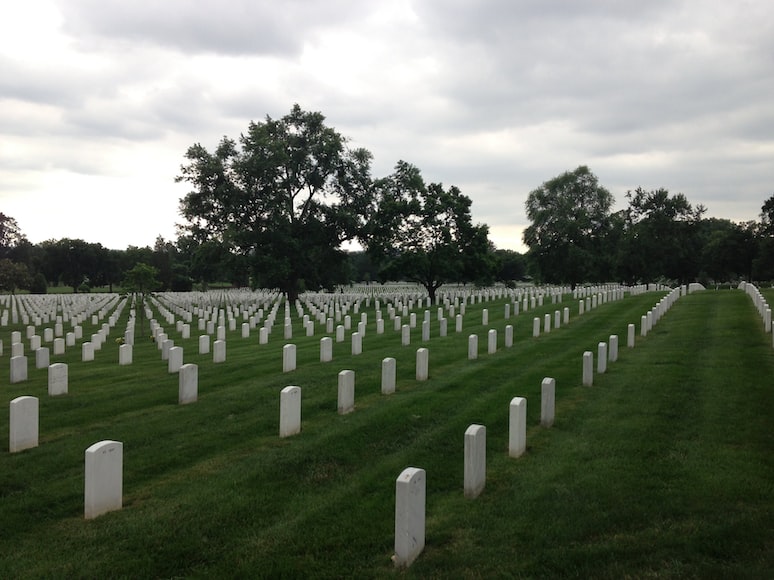
Photo: Janne Simoes/Unsplash
Advancement Opportunities
This section will explore different career possibilities and specializations within the death care industry. While funeral directing is a well-known career path, there are many other roles that involve providing end-of-life care and support. Whether you are interested in helping individuals and families through the grieving process or managing the practical aspects of funeral services, there are a range of career options to explore within this field. By gaining an understanding of the different career paths available, you can begin to identify the roles that align with your interests, skills, and values, and take steps to develop a meaningful and fulfilling career in the death care industry.
Interesting fact:
Funeral Directors may work with families of different religious and cultural backgrounds, and must be knowledgeable and respectful of various customs and traditions.
Steps to Develop a Funeral Director Career
Here are the steps you can take to develop a career as a Funeral Director:
- Research the profession: Start by researching the funeral industry and learning more about the role of a Funeral Director. Attend informational sessions or seminars, read books or articles, and connect with professionals in the field.
- Meet the qualifications: To become a Funeral Director, you will need to meet certain qualifications, such as obtaining a degree in mortuary science from an accredited institution and passing a state licensing exam.
- Gain work experience: Look for opportunities to gain experience in the funeral industry, such as internships or entry-level positions at funeral homes. This will help you develop the skills and knowledge needed to succeed as a Funeral Director.
- Obtain licensure: Once you have completed your education and gained sufficient work experience, you will need to obtain a license to practice as a Funeral Director. Licensing requirements vary by state, so be sure to check the requirements in your state.
- Build your network: Connect with other professionals in the funeral industry, such as other Funeral Directors, embalmers, and cemetery workers. Attend industry events and conferences to meet new people and build relationships.
- Develop your skills: As a Funeral Director, you will need to have strong communication and interpersonal skills, as well as empathy and compassion for those who are grieving. Consider taking courses or workshops to further develop these skills.
- Consider specialization: You may choose to specialize in a particular area of funeral services, such as cremation or green burials. Consider obtaining additional training or certification in your chosen area of specialization.
- Stay current: Keep up to date with the latest developments and trends in the funeral industry, and continue to learn and grow as a professional. Attend workshops, read industry publications, and stay connected with your professional network.
Specializations in Funeral Direction Field
Funeral directing is a diverse field, and there are many specializations within it. Here are a few examples:
Specialization | Description |
Cremation specialist | A cremation specialist is responsible for overseeing the cremation process, ensuring that it is carried out properly and with dignity. |
Green burial specialist | A green burial specialist is responsible for arranging eco-friendly burial options, such as using biodegradable coffins or shrouds, and minimizing the environmental impact of the funeral service. |
Funeral planner | A funeral planner is responsible for coordinating all aspects of a funeral service, from selecting the funeral home and arranging the details of the service to coordinating transportation and managing the budget. |
Pre-need specialist | A pre-need specialist works with individuals and families to plan and pre-pay for their funeral arrangements, helping to ease the burden on their loved ones during a difficult time. |
Grief counselor | A grief counselor is responsible for providing emotional support to those who are grieving, helping them to cope with their loss and navigate the funeral process. |
Memorialization specialist | A memorialization specialist is responsible for helping families to create lasting tributes to their loved ones, such as memorial websites, monuments, and other commemorative items. |
These are just a few examples of the many specializations within the funeral directing field. As you gain experience in the industry, you may find that you are drawn to a particular area and choose to specialize in it.
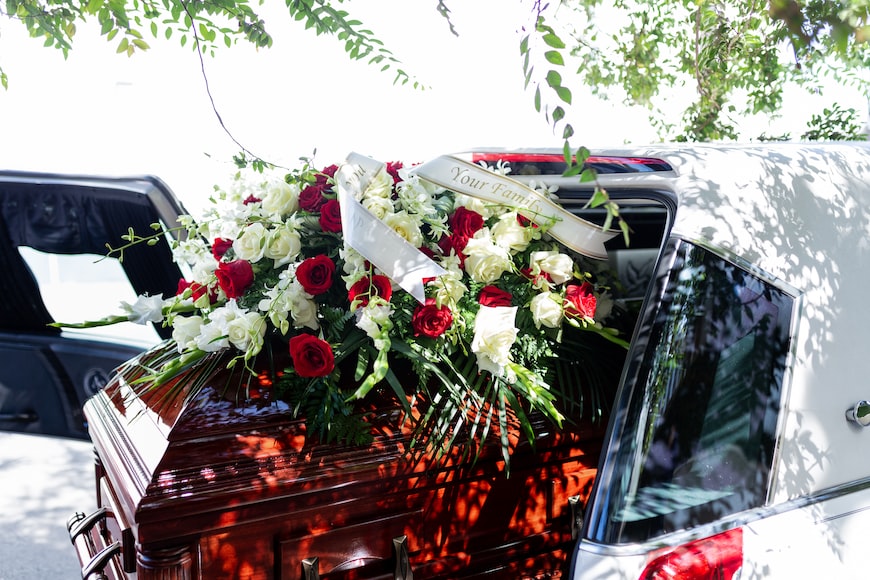
Photo: adrianna geo/Unsplash
Other Career Possibilities
While funeral directing is a specific career path, there are other related career possibilities within the death care industry. Here are a few examples:
- Embalmer: An embalmer is responsible for preparing the deceased for burial or cremation, using chemicals to preserve the body and applying cosmetics to create a natural appearance.
- Cemetery worker: A cemetery worker is responsible for maintaining and managing cemetery grounds, including planting and caring for flowers, mowing grass, and repairing headstones.
- Mortuary science educator: A mortuary science educator teaches students the skills and knowledge needed to become Funeral Directors, embalmers, and other death care professionals.
- Medical examiner: A medical examiner is a physician who investigates deaths and determines the cause and manner of death, particularly in cases of sudden or unexpected deaths.
- Death doula: A death doula provides emotional and spiritual support to individuals and families as they navigate end-of-life care and the dying process.
- Funeral home owner/manager: A funeral home owner or manager is responsible for running the day-to-day operations of a funeral home, including managing staff, coordinating services, and overseeing finances.
- Bereavement counselor: A bereavement counselor provides emotional support and counseling to individuals and families who are grieving the loss of a loved one.
Each role has its own unique requirements and qualifications, so be sure to research your options thoroughly before pursuing a particular path.
Interesting fact:
The cost of a funeral can vary widely depending on the location, services provided, and other factors. Funeral Directors may work with families to help them understand and navigate the costs involved.
The death care industry is an important field for those who are interested in helping individuals and families during a difficult time. While funeral directing is a well-known career path, there are many other roles within the industry that offer unique opportunities to provide support and care. Whether you are interested in working as an embalmer, cemetery worker, mortuary science educator, medical examiner, death doula, funeral home owner/manager, or bereavement counselor, there are a range of career possibilities to explore. By gaining an understanding of the different roles and specializations available, you can begin to identify the path that is right for you and take steps to develop a fulfilling and meaningful career in the death care industry.
Employment Trends
Funeral Director Demand
The job outlook for Funeral Directors varies depending on the region and the state of the economy. According to the Bureau of Labor Statistics (BLS), employment of Funeral Directors is projected to grow 8 percent from 2021 to 2031, faster than the average for all occupations.
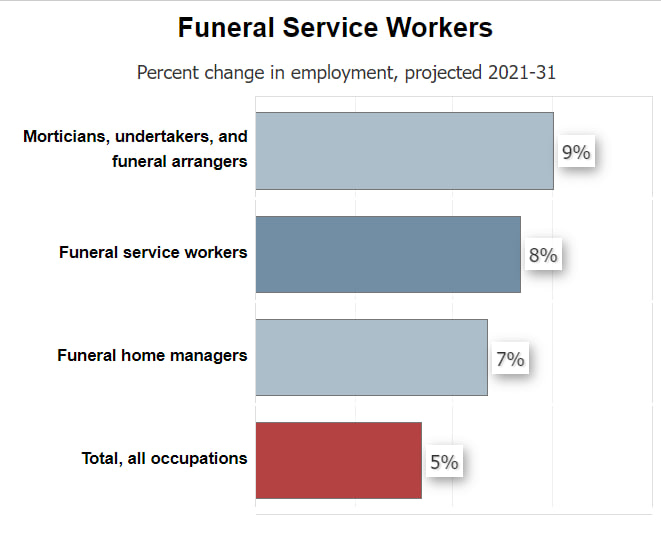
Source: U.S. Bureau of Labor Statistics, Employment Projections program
The demand for Funeral Directors is driven by a growing aging population and the need for end-of-life services. As more baby boomers reach their golden years, the demand for funeral services is expected to increase. Additionally, as people become more aware of the benefits of pre-planning their own funerals, the demand for Funeral Directors is expected to grow.
However, the industry is also facing some challenges. For example, some people are choosing alternative forms of disposition such as cremation, which is typically less expensive than a traditional burial. In addition, funeral homes are facing competition from online retailers who offer caskets and urns at discounted prices.
Overall, the job outlook for Funeral Directors is expected to grow, but competition may be high in some areas. Funeral Directors who have strong communication skills and are able to provide excellent customer service are likely to be in high demand.
Flexible and Remote Work Arrangements
Flexible and remote job options for Funeral Directors are limited, as the nature of the job involves working closely with clients and coordinating services that often require in-person meetings and physical presence at funeral homes and cemeteries. However, there are a few possible options that may allow for more flexibility and remote work:
- Funeral planning services: Some funeral homes and companies offer remote funeral planning services, where Funeral Directors work with clients over the phone or video chat to plan the details of a funeral or memorial service.
- Online funeral resources: There are some websites and platforms that offer funeral resources and guidance, and some may hire Funeral Directors to write articles, create educational materials, or provide consulting services remotely.
- Funeral insurance companies: Some insurance companies that offer funeral insurance policies may hire Funeral Directors to provide guidance and support to policyholders, which could potentially be done remotely.
- Funeral software companies: There are software companies that specialize in providing tools and solutions for funeral homes and directors, and they may hire Funeral Directors to provide customer support and training remotely.
Overall, while flexible and remote job options for Funeral Directors are limited, it is possible to find some opportunities that allow for more flexibility and remote work, particularly in roles that involve consulting or support services.
Interesting fact:
Funeral Directors may offer a range of services beyond traditional funerals, including cremation, green burials, and other forms of disposition.
Job Fulfillment
Job fulfillment for Funeral Directors can vary depending on the individual's personal values, interests, and motivations. So, in this section we look into some common pros and cons for Funeral Directors’ job.
Pros | Cons |
The opportunity to help others during a difficult time can be deeply rewarding. | The job can be emotionally challenging, requiring Funeral Directors to deal with grief and loss on a regular basis. |
Building meaningful relationships with clients can lead to a sense of fulfillment and purpose. | The work can be physically demanding, particularly for those who are involved in the preparation and handling of the deceased. |
The work can be varied and challenging, requiring a range of specialized skills and knowledge. | Funeral Directors may be required to work long and irregular hours, including nights, weekends, and holidays. |
Funeral Directors have the opportunity to make a positive impact in their local communities. | The job can be stressful, particularly when dealing with difficult or demanding clients. |
The job can offer a stable career with opportunities for advancement. | Funeral Directors may be exposed to hazardous materials and chemicals, which can pose a risk to their health and safety. |
Funeral directing can be a fulfilling career for those who are passionate about helping others, building relationships, utilizing specialized skills, making a positive impact in their communities, and seeking a stable career with opportunities for advancement. However, the job can also be emotionally and physically challenging, require long and irregular hours, be stressful, and involve exposure to hazardous materials and chemicals.

Photo: Eli Solitas/Unsplash
In conclusion, the Funeral Director profession plays a vital role in providing end-of-life services and support to grieving families. Funeral Directors require a unique set of qualifications, including education and training, licensing and certification, strong interpersonal and organizational skills, attention to detail, and compassion for grieving families. They must also be proficient in a range of hard and soft skills to provide high-quality funeral services. The article emphasizes the importance of a well-designed work environment and access to the right tools and technologies to help Funeral Directors provide the best possible support to families during their time of need. The death care industry offers rewarding and meaningful career opportunities for those who are passionate about helping individuals and families during a difficult time. Despite the challenges facing the Funeral Director profession, the industry is expected to grow over the next decade, driven by a growing aging population and the need for end-of-life services.
- Funeral Directors assist families in planning and organizing funerals or memorial services for their loved ones who have passed away, and require qualifications such as education and training, licensing and certification, strong interpersonal and organizational skills, attention to detail, and compassion for grieving families.
- Supplementary perks or fringe benefits are additional benefits that employees receive in addition to their regular salary or wages, and can help attract and retain employees, improve job satisfaction, and contribute to a positive work culture.
- Funeral Directors need a suitable work environment and access to the right tools and technologies to perform their job duties efficiently, and must stay up-to-date on the latest advancements in funeral technology and continuously improve services to meet the changing needs of clients.
- Becoming a Funeral Director requires completing a high school diploma or equivalent, followed by a degree in mortuary science or an apprenticeship with a licensed funeral home or mortuary, and all states require Funeral Directors to be licensed, which involves passing an exam and participating in continuing education.
- The death care industry offers rewarding and meaningful career opportunities for those who are passionate about helping individuals and families during a difficult time, and there are different career paths and specializations within the industry, such as embalmer, cemetery worker, mortuary science educator, medical examiner, death doula, funeral home owner/manager, and bereavement counselor.
- The job outlook for Funeral Directors is expected to grow at an average rate of 8% from 2021 to 2031, driven by a growing aging population and the need for end-of-life services, but the industry is also facing some challenges such as competition from online retailers and alternative forms of disposition.
- Funeral directing can be a fulfilling career for those who are passionate about helping others, but can also be emotionally and physically challenging, require long and irregular hours, be stressful, and involve exposure to hazardous materials and chemicals.
FAQ
What is the role of a Funeral Director?
The role of a Funeral Director is to assist families in planning and organizing funerals or memorial services for their loved ones who have passed away. They handle tasks such as preparing the body, coordinating the service, providing emotional support, managing finances, ensuring legal compliance, and maintaining facilities.
What qualifications does a Funeral Director need?
Funeral Directors typically need to have a degree in mortuary science or complete an apprenticeship with a licensed funeral home or mortuary. They must also be licensed in all states, which involves passing an exam. Additionally, Funeral Directors should have strong interpersonal and organizational skills, attention to detail, and compassion for grieving families.
What skills do Funeral Directors need?
Funeral Directors need a combination of hard and soft skills. Hard skills include knowledge of mortuary science, legal documentation, financial management, and organizational skills, while soft skills include compassion, communication, professionalism, attention to detail, problem-solving, adaptability, and cultural competence.
What benefits do Funeral Directors receive?
Benefits for Funeral Directors can vary depending on the employer. Some common benefits include health and wellness benefits, retirement benefits, flexible work arrangements, professional development opportunities, childcare benefits, paid time off, and employee discounts.